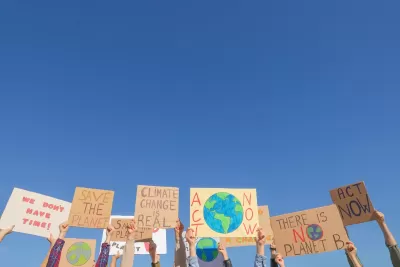A recent study found that the terms “climate change” and “global warming” are more familiar and generate greater public concern than less recognized terms like “climate crisis” and “climate justice.”

A University of Southern California (USC) study published in Climatic Change reveals that the terms “climate change” and “global warming” are more familiar to the public and generate greater concern than less recognized terms like “climate crisis,” “climate emergency,” and “climate justice.” The study found that almost 90 percent of respondents were familiar with “climate change” and “global warming,” while only 33 percent recognized “climate justice.” This familiarity significantly influences how people perceive and respond to environmental issues.
The research also explored the connection between terminology and public willingness to support climate-friendly policies and lifestyle changes, such as reducing red meat consumption. Although overall support for climate action was consistent across different terms, the study noted that familiarity with terms like “climate change” increased the urgency felt by respondents. Political affiliation played a significant role in shaping responses, with Democrats and Independents expressing more concern and willingness to act than Republicans.
A notable finding of the study was the polarization of the term “climate justice,” which was recognized and supported by a higher percentage of Democrats compared to Republicans. The researchers suggest that the political connotations and lesser-known nature of the term contribute to its lower resonance among the general public. The study emphasizes the importance of using familiar terminology when communicating about climate issues to ensure broader public engagement and concern.
The study was conducted with 5,137 U.S. residents and included contributions from scholars at various USC schools. It highlights the critical role of language in shaping public attitudes toward climate change and underscores the need for strategic communication in advancing climate policy and action.
FULL STORY: Study: Just Say “Climate Change” – not “Climate Emergency”

Planetizen Federal Action Tracker
A weekly monitor of how Trump’s orders and actions are impacting planners and planning in America.

Restaurant Patios Were a Pandemic Win — Why Were They so Hard to Keep?
Social distancing requirements and changes in travel patterns prompted cities to pilot new uses for street and sidewalk space. Then it got complicated.

Map: Where Senate Republicans Want to Sell Your Public Lands
For public land advocates, the Senate Republicans’ proposal to sell millions of acres of public land in the West is “the biggest fight of their careers.”

Maui's Vacation Rental Debate Turns Ugly
Verbal attacks, misinformation campaigns and fistfights plague a high-stakes debate to convert thousands of vacation rentals into long-term housing.

San Francisco Suspends Traffic Calming Amidst Record Deaths
Citing “a challenging fiscal landscape,” the city will cease the program on the heels of 42 traffic deaths, including 24 pedestrians.

California Homeless Arrests, Citations Spike After Ruling
An investigation reveals that anti-homeless actions increased up to 500% after Grants Pass v. Johnson — even in cities claiming no policy change.
Urban Design for Planners 1: Software Tools
This six-course series explores essential urban design concepts using open source software and equips planners with the tools they need to participate fully in the urban design process.
Planning for Universal Design
Learn the tools for implementing Universal Design in planning regulations.
Heyer Gruel & Associates PA
JM Goldson LLC
Custer County Colorado
City of Camden Redevelopment Agency
City of Astoria
Transportation Research & Education Center (TREC) at Portland State University
Camden Redevelopment Agency
City of Claremont
Municipality of Princeton (NJ)





























